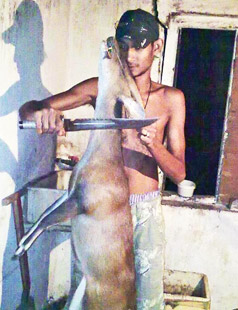Social media to the rescue
Public outcry against wildlife hunting, law
enforcement weak:
by Uditha Kumarasinghe
 The
Ministry of Sustainable Development and Wildlife will introduce
stringent laws to deal with the rapidly increasing poaching of wild
animals, following the arrest of six persons for killing wild animals in
the Knuckles Conservation Forest. These pictures were widely circulated
on Facebook recently. Environmentalists are of the opinion that there is
no increase in hunting incidents in Sri Lanka, but an increase in
detections which is a good trend. They say, the present Wildlife
Ordinance is quite sufficient to cover all hunting incidents, but the
problem lies with the enforcement of the law. The
Ministry of Sustainable Development and Wildlife will introduce
stringent laws to deal with the rapidly increasing poaching of wild
animals, following the arrest of six persons for killing wild animals in
the Knuckles Conservation Forest. These pictures were widely circulated
on Facebook recently. Environmentalists are of the opinion that there is
no increase in hunting incidents in Sri Lanka, but an increase in
detections which is a good trend. They say, the present Wildlife
Ordinance is quite sufficient to cover all hunting incidents, but the
problem lies with the enforcement of the law.
Meanwhile, Sustainable Development and Wildlife Minister Gamini
Jayawickrama Perera has appreciated the contribution made by the social
media, including Facebook, to create a public opinion against the
hunting of wild animals in the country, following the arrest of a group
of people captured with the hunted animals, as posted in Facebook. Six
were arrested for killing wild animals in the Knuckles Conservation
Forest whose photos were circulated on Facebook recently. Several
pictures of the suspects with meat of various animals went viral on
social media sites creating a massive uproar among the public. The
suspects were remanded until July 7 after being produced before the
Teldeniya Magistrate. Following this incident, the Ministry decided to
impose stringent laws against those torturing, harassing and killing
animals in the wilds.
The Minister stressed the importance of reforming the outdated laws
on poaching. A panel has been appointed to reform the 30-year-old Wild
Life Act. Minister Perera pointed out that support of the Police to
investigate wildlife crimes is being enlisted and the offenders will be
severely dealt with. He said, legal advice will be sought to ban the use
of air rifles as they are a danger to humans as well as animals. He
warned, such weapons can also be dangerous in the hands of the youth, as
in the US. Environmental lawyer Jagath Gunawardena told the Sunday
Observer, there is no increase in hunting incidents in Sri Lanka, but an
increase in detections, which is a good trend. He said, hunting is still
going on and some offenders never get caught. The present Wildlife
Ordinance is quite sufficient to deal with all hunting incidents, but
the problem lies with the enforcement of the law. If it is implemented
properly and efficiently, the problems could be addressed
satisfactorily.
Enforcement authorities are largely restrained or constrained by
various inadequacies, such as, lack of resources, mobility, morale,
official interference and so on. Sections 30, 31, 31 A, 31 B and 12 of
the Ordinance protect the threatened species. In Sri Lanka, hunting has
been allowed only on non-protected species of animals. But, there are
restrictions, no hunting can be done at night, near water-holes using
poison or explosives. So, there are limitations.
 Environmentalists
have stressed the need for wildlife officers to enlist the support of
the Armed Forces and Police where necessary. The wildlife officers
should be empowered to carry out raids even in eateries selling animal
flesh and also places where carcasses are stored. Meanwhile, a reliable
source confirmed that poachers are active in Yala, the Knuckles Range,
Panwila, Sinharaja, Wasgamuwa and Hambantota wildlife parks and forest
reserves. He said, some endemic animals have been wiped out in these
areas due to poaching which also disturbed the food chain eco-system.
The wildlife officers needed more training in the use of weapons and
combating poachers. According to the Flora and Fauna Protection Act, the
killing of any animal with poison is illegal while catching fish using
poison is also outlawed by the Fisheries and Aquatic Resources Act, and
culprits could be fined, as well as imprisoned. Environmentalists
have stressed the need for wildlife officers to enlist the support of
the Armed Forces and Police where necessary. The wildlife officers
should be empowered to carry out raids even in eateries selling animal
flesh and also places where carcasses are stored. Meanwhile, a reliable
source confirmed that poachers are active in Yala, the Knuckles Range,
Panwila, Sinharaja, Wasgamuwa and Hambantota wildlife parks and forest
reserves. He said, some endemic animals have been wiped out in these
areas due to poaching which also disturbed the food chain eco-system.
The wildlife officers needed more training in the use of weapons and
combating poachers. According to the Flora and Fauna Protection Act, the
killing of any animal with poison is illegal while catching fish using
poison is also outlawed by the Fisheries and Aquatic Resources Act, and
culprits could be fined, as well as imprisoned.
However, environmentalists claimed illegal wildlife trade was still
on the rise, with Sri Lanka fast becoming a hub. They pointed out the
lack of law enforcement and regulation as the root cause of the problem.
According to a report on "Rise of Environmental Crime" by the United
Nations Environment Programme (UNEP) and INTERPOL in 2016, the cost of
the global environmental crimes was estimated to be as high as $258
billion, 26 percent higher than previous estimations. Environmental
crime encompasses illegal wildlife trade, forest crimes, exploitation of
minerals, illegal fisheries, trafficking of hazardous waste and carbon
credit fraud.
Law enforcement agencies as well as environmentalists have underlined
the need to integrate the Convention on International Trade in
Endangered Species of wild fauna and flora (CITES) into local
legislation to combat the problem. Internal administrative issues,
including the resignation of Director General of Wildlife, have caused
instability in the Sustainable Development and Wildlife Ministry. It has
led to delaying the drafting of CITES to include it into domestic
legislation. |

